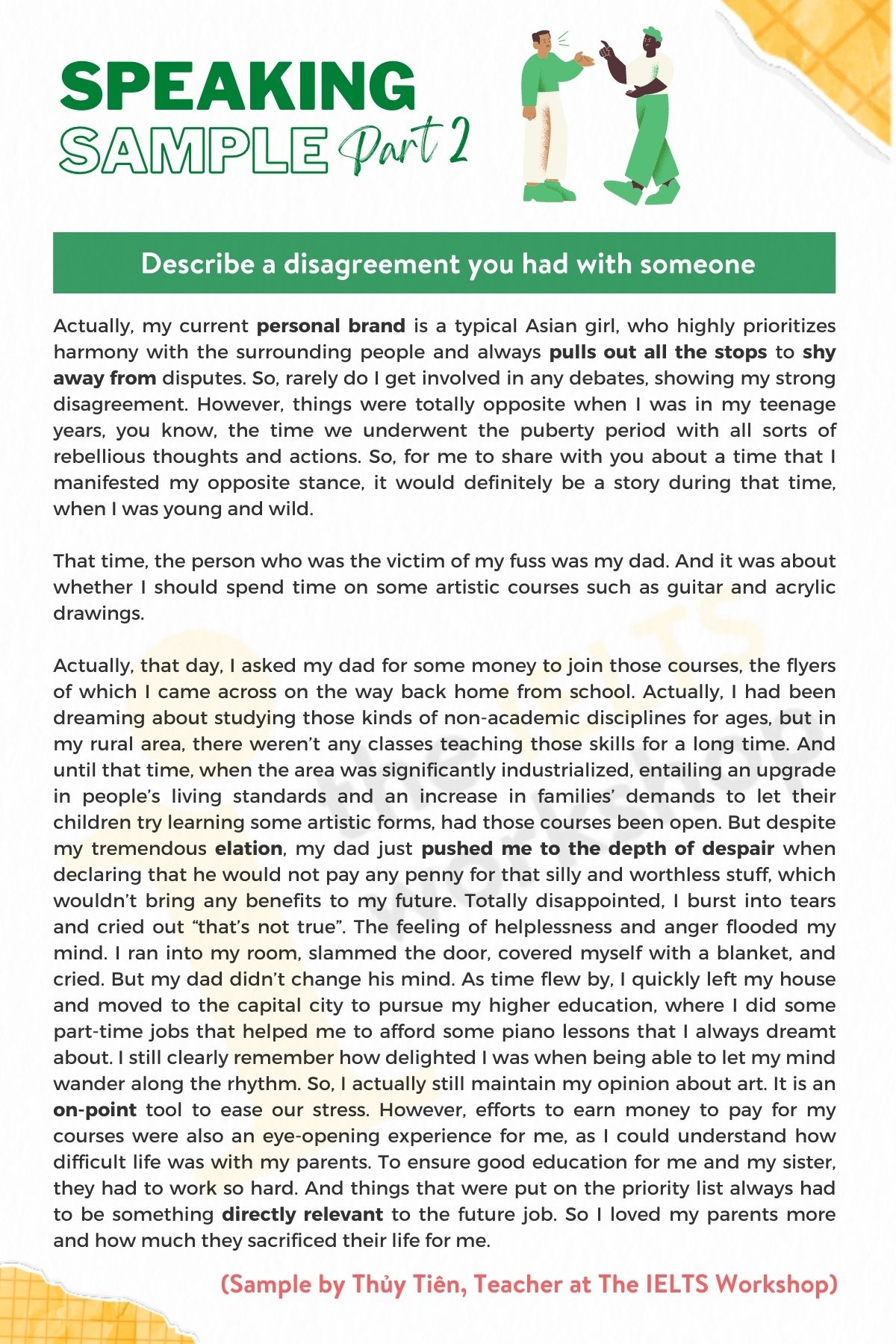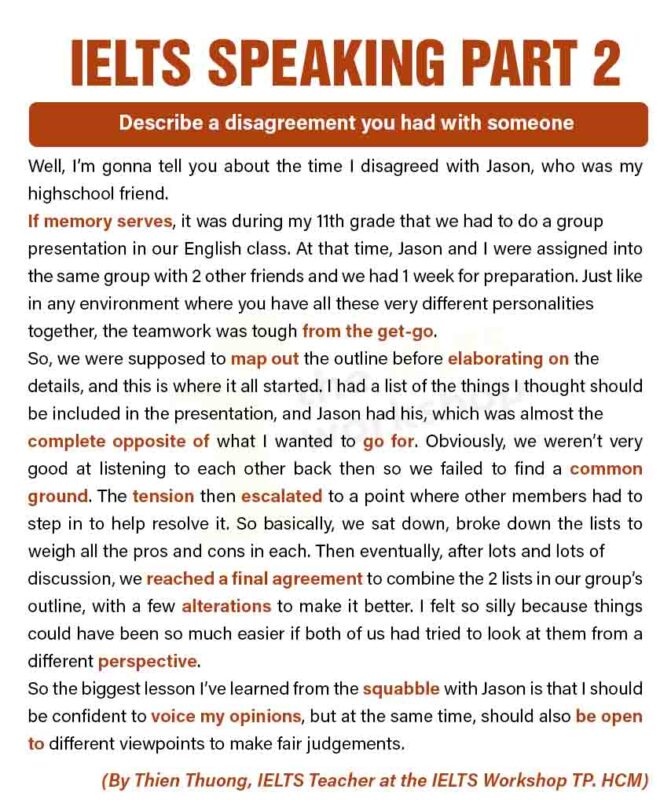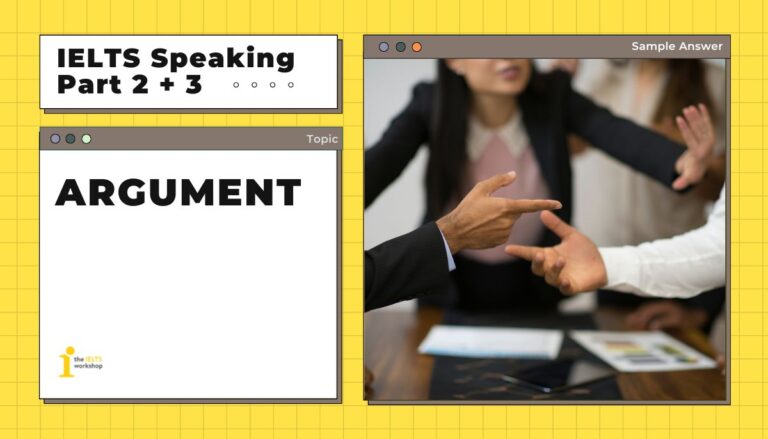Trong bài giải mẫu lần này cô Thủy Tiên của The IELTS Workshop HN và cô Thiên Thương của The IELTS Workshop TP. HCM sẽ hướng dẫn bạn trả lời một số câu hỏi liên quan đến chủ đề Argument qua IELTS Speaking Part 2 & 3. Cùng tham khảo sample, từ vựng và một vài cách diễn đạt ghi điểm trong phần thi IELTS Speaking nhé.
Part 2: Describe a disagreement you had with someone
Describe a disagreement you had with someone
You should say:
Who you had the disagreement with
What the disagreement was
What happened
And explain how you felt about it
Dưới đây là bài mẫu của cô Thủy Tiên cho topic “Describe a disagreement you had with someone” các bạn hãy tham khảo nhé.
1. Bài mẫu 1 (Sample Answer)

2. Từ vựng (Vocabulary Highlight)
- Personal brand: nhân hiệu
- pull out all the stops: Cố gắng hết sức
- shy away from something: Né tránh điều gì
- pushed someone to the depth of despair: Khiến ai đó tuyệt vọng
- Elation: Sự phấn khởi
- On-point: Hoàn hảo
- Directly relevant: Liên quan trực tiếp
2. Bài mẫu 2 (Sample Answer)

4. Từ vựng (Vocabulary Highlight)
- From the get-go = from the beginning
- Map out (v) arrange something carefully
- Elaborate on (v) explain sth in a detailed way
- Be the complete opposite of sth: to be completely different
- Go for (v) choose
- Common ground (n) opinions shared by two or more people
- Tension (n) a situation in which people are unfriendly with each other
- Escalate (v) become greater/worse
- Reach an agreement = agree with sb on sth
- Alteration (n) change
- If [past perfect- had V3], [would/could have V3]: If for an unreal situation in the past
- Perspective (n) a way of thinking about sth
- Be open to sth (adj) be willing to consider or accept something new
Part 3: Argument
Bên cạnh Part 2, bạn hãy tham khảo thêm Part 3 của cô Thuỷ Tiên – Giáo viên The IELTS Workshop HN và với Sample 1 và thầy Triệu Thành – Giáo viên The IELTS Workshop TP. HCM với Sample 2 cho chủ đề này nhé
1. What will you do if you disagree with someone?
2. How can we stop an argument from escalating into a fight?
3. Who do you think should teach children to respect their teacher?
4. What disagreements do parents and children usually have?
1. What will you do if you disagree with someone?
Sample 1: Normally, as I mentioned before, at a mature age like now rarely do I get engaged in controversy. However, in unavoidable situations, I would try to show my argument most mildly. Calmness in the voice pitch and volume would be two things that I pay the most attention to when expressing my opinion. And then, I also try to avoid refuting other people’s opinions too harshly. Instead, I tend to say that I may be wrong, but I think this way.
- Voice pitch: cao độ giọng nói
Sample 2: Normally, I would just shrug my shoulder as everyone is entitled to their own opinion, as long as it’s not something heinous. There’s little point in getting to the bottom of problems about which opinion divides. Given the impatience of people today, it may escalate to ad hominem remarks quite rapidly, which could lead to scuffles and ensuing liabilities.
- shrug my shoulder: nhún vai không quan tâm
- heinous: ghê tởm
- getting to the bottom: xoáy sâu
- opinion divides: có nhiều ý kiến trái chiều
- ad hominem remarks: công kích cá nhân
- scuffles: xô xát
- ensuing liabilities: trách nhiệm pháp lý đi kèm
2. How can we stop an argument from escalating into a fight?
Sample 1: Actually, I did some research on this several months ago as I realized how bad I still was at de-escalating an argument. And I found out that quite interestingly, the first thing that we need to do is just to pause the conversation for a few seconds to take a deep breath. And then, we can better process what the other people are trying to say. Although trying to defend ourselves immediately tends to be our immediate reaction when we face someone attacking us. However, that kind of action would normally lead to an emotional instead of a rational response, and then worsened situations as an understandable result.
- De-escalate into fight: Giảm leo thang một cuộc chiến
- Rational: sáng suốt
Sample 2: Just friendly agree to disagree, I’d suppose. It is inadvisable to force people into your way of thinking when everyone was of different cultures, or backgrounds. Debates should be cordial, with mutual respects from all people involved; and no toleration for offensive language, which is what usually triggers violence.
- Just friendly agree to disagree: chấp nhận ý kiến của nhau và không tranh luận thêm
- cordial: thân thiện lịch sự
- toleration: dung thứ
- offensive language: ngôn ngữ xúc phạm
- triggers violence: kích động bạo lực
3. Who do you think should teach children to respect their teacher?
Sample 1: Well, this question hits a very aching phenomenon in Vietnam lately. Newspapers and other means of mass media in my country have recently reported cases in which students throw insults at their teachers, who should have received much more respect from learners. To solve this issue, I fervently believe that both schools and families must join hands to help sow the seed of gratitude in students’ minds for people who help them to do something. However, the former should play the more important role because as for ethical standards, from my observation, parents tend to wield greater influence on youngsters.
Sample 2: This should be the parents’ responsibility. Personally, it would appear peculiar if a teacher were to ask his students to pay respect to him. Therefore, parents should educate their children about the significance of teachers in the formation of character, so that the children are aware of it.
- formation of character: hình thành nhân cách
4. What disagreements do parents and children usually have?
Sample 1: Based on my observation, family members from different generations usually disagree on all sorts of aspects in their lives, from simple things like fashion,and financial management to grandeur issues like sets of politeness standards. And usually, if they don’t try to put themselves in other people’s shoes, families may never be an ideal place with love and peace as normally claimed.
- Put yourselves in other people’s shoes: đặt mình vào vị trí của người khác
- Grandeur issue: Vấn đề lớn
Sample 2: Most of the quarreling is about broken promises from the parents and wheedling from the kids. Parents often make pledges to calm their offspring whenever they are noisy or impatient. Then, when the dads and moms realize the burden is huge, especially when the costs of the pledge is too high, they go back on their promise, that’s when the squabbling erupts. Similarly, when a child is asking for an item such as a toy and the parents do not wish to overindulge him, it also results in unpleasant scenes between them.
- wheedling: vòi vĩnh
- make pledges: hứa hẹn
- go back on: nuốt lời
- squabbling: cự cãi
- erupts: bùng nổ
- overindulge: nuông chiều quá mức
- unpleasant scenes: cảnh tượng không đẹp
Trên đây là những nội dung bạn có thể tham khảo khi luyện tập chủ đề Argument trong IELTS Speaking Part 2 và Part 3.
Nếu bạn đang gặp khó khăn trong xây dựng câu trả lời cho phần thi IELTS Speaking Part 3, hãy tham khảo ngay phương pháp học tại khóa Senior của The IELTS Workshop.









